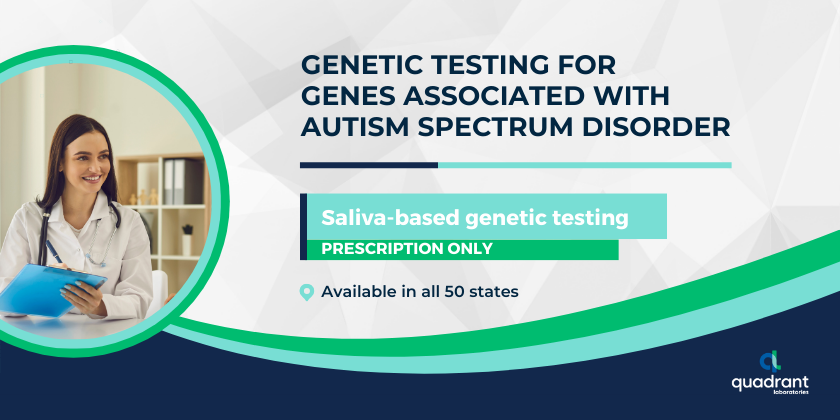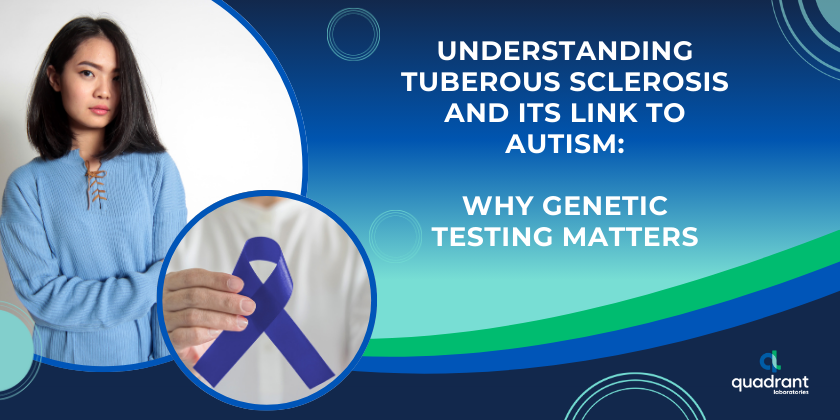
Now offering Genetic Testing focused on Autism
Autism Spectrum Disorder (ASD) is a complex neurodevelopmental condition that is believed to have both genetic and environmental factors contributing to its manifestation. Genetic testing has emerged as a valuable tool in understanding the genetic basis of ASD, aiding in early diagnosis of co-occurring conditions, personalized treatment plans, and ongoing research. In this blog post, we delve into the landscape of genetic testing for autism, providing insights into the options available for testing, including Quadrant’s new Autism/XL-Intellectual Disabilities Panel Test.
Understanding the Importance of Genetic Testing for ASD
Genetic testing for autism spectrum disorder involves analyzing an individual’s DNA to identify genetic variations that may be linked to autism or contributing to specific symptoms associated with the condition. This process has proven instrumental in the diagnostic journey lighting the way for a more accurate diagnosis and tailored care plans. For these reasons, organizations like the American Academy of Pediatrics (AAP) and the American Academy of Neurology (AAN) recommend genetic testing following a diagnosis of any intellectual or developmental delay, including autism.
Landscape of Genetic Testing
Several institutions conduct genetic testing, including companies like 23 and Me or Ancestry DNA. These types of facilities offer the ease of direct-to-consumer testing by circumventing a doctor’s prescription, but it is important to note that these types of facilities cannot provide a diagnosis, medical advice or help you gain access to resources and services.
There are thousands of academic and research organizations actively engaged in autism research. Research institutions such as SPARK or AGRE aim to help scientists find and better understand the potential causes of autism. In research scenarios, there are cases where individuals or their families might not be informed about the test results. Alternatively, some researchers may choose to disclose results only when a genetic variation is detected and is known to be associated with autism. However, because research is constantly evolving if a genetic variation is found researchers may not link it to autism until they find that same variation common among other subjects and their families.
Hospitals and medical centers offer genetic testing services for various conditions including autism and intellectual disabilities. While hospital-based genetic testing is an essential component of the diagnostic process, it frequently features restricted testing panels which can result in increased costs and prolonged waiting periods for the delivery of test results.
All of these genetic testing organizations can offer certain genetic insights into autism, but obtaining a more comprehensive understanding of these conditions is achievable by utilizing specialized genetic laboratories. Numerous laboratories specialize in genetic testing, with the majority concentrating on cancer panels. However, only a few handfuls of genetic labs specifically target neurological disorders. Quadrant’s genetic laboratory prioritizes neurological conditions including autism, intellectual disabilities, Fragile X syndrome, and other neurological conditions, aiming to assist patients and their families in seeking answers.
A Focus on Autism
What sets Quadrant Laboratories apart is our dedicated focus on autism from the top down. Quadrant Laboratories is a subsidiary of Quadrant Biosciences, a life sciences company with four core businesses focused on helping patients and families with autism. The collective proficiency in this area enhances and refines our understanding, expertise, and nuances associated with autism diagnoses. This guidance empowers our clinical team to prioritize tests that can positively impact families living with autism.
In October 2023, the New York State Department of Health (NYSDOH) approved Quadrant’s clinical lab for genetic testing. While many labs cast a wide net in genetic testing, Quadrant has honed our expertise to shine a spotlight on the specific genes associated with ASD. Our comprehensive test panel targets the most up-to-date genes that are associated with both syndromic and non-syndromic causes of autism spectrum disorder (ASD) and intellectual disabilities (ID). Certain intellectual disabilities might coincide with autism, such as Fragile X syndrome. Therefore, we deemed it essential to incorporate the genes linked to these conditions.
Our genetic panel for ASD/ID Panel utilizes next-generation sequencing (NGS) to identify genetic variants, including copy number variant (CNV) detection to increase diagnostic yield. Supplemental and confirmatory technology used to complement this panel may include chromosomal microarray (CMA), quantitative PCR, and Sanger sequencing. These methods aim to provide patients and healthcare providers with a thorough perspective on their genetic test panel.
Continuation of Discovery
As new research findings on linked genetic associations emerge, our clinical laboratory will consistently incorporate additional genes into our ASD panel. We remain committed to collaborating with our research partners, including Quadrant Life Sciences, and establishing new collaborations with prominent research institutions, universities, and advocacy groups that contribute to the shared knowledge base. Through collective participation in research initiatives, our goal is to accelerate breakthroughs and continuously broaden our array of testing options, with the potential to enhance the lives of individuals affected by these conditions.
Empowering Families and Healthcare Providers
Genetic testing offers vital insights into an autism diagnosis. Detecting a potential genetic cause can assist in shaping treatment plans and linking patients and their families to pertinent resources. This highlights the importance of making access to testing easier for everyone. Following an autism diagnosis, healthcare providers nationwide can order our genetic test, and we will ship an at-home saliva collection kit directly to the patient. Patients can conveniently collect the sample at their own pace, within the comfort of their homes, eliminating the need for additional trips to a lab for uncomfortable blood draws.
Additionally, our Genetic Counselors are available to both healthcare professionals and patients, guaranteeing a comprehensive understanding of the result implications and providing advice on care plans. This knowledge and guidance empower both families and healthcare providers to make informed healthcare decisions.
—
Conclusion
As Quadrant Laboratories steps onto the stage of genetic testing for neurological conditions, it brings with it a promise of hope and discovery. The convergence of cutting-edge technology, a focused research agenda, and a collaborative spirit positions Quadrant as a key player in unraveling the genetic mysteries that shroud neurodevelopmental disorders. In the quest for understanding, Quadrant Laboratories serves as a guiding light, illuminating the way to a future where personalized genetic insights lead to customized interventions and enhanced outcomes for individuals and families impacted by autism and intellectual disabilities.
Quadrant Laboratories is regulated under the Clinical Laboratory Improvement Amendments (CLIA) program through the Centers for Medicare & Medicaid Services. Genetic testing is available to order in all 50 states utilizing an at-home saliva collection process.



